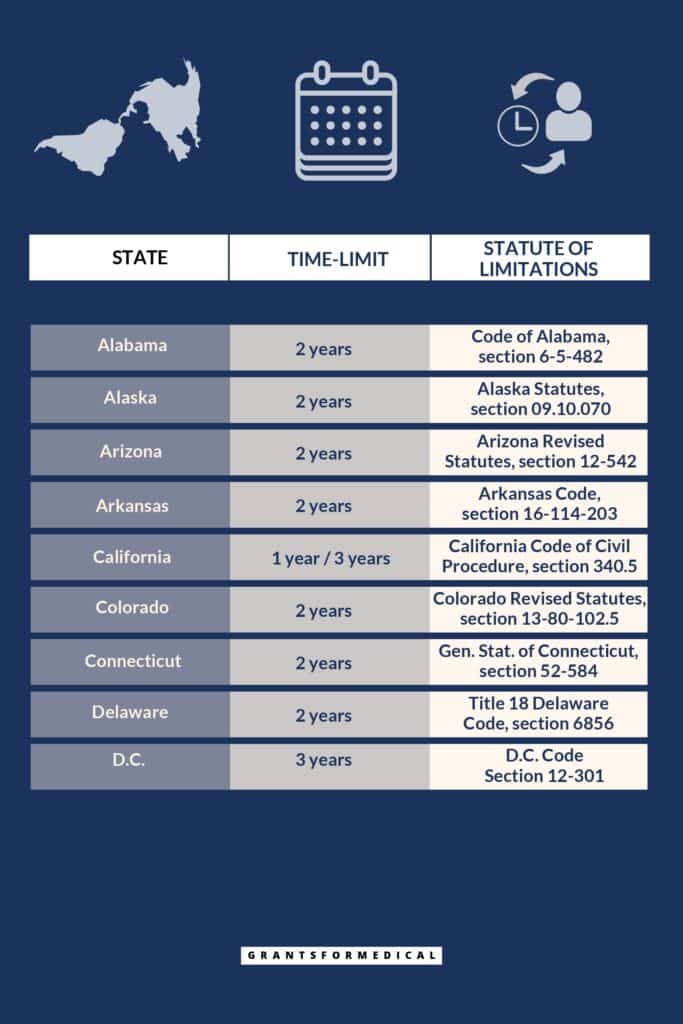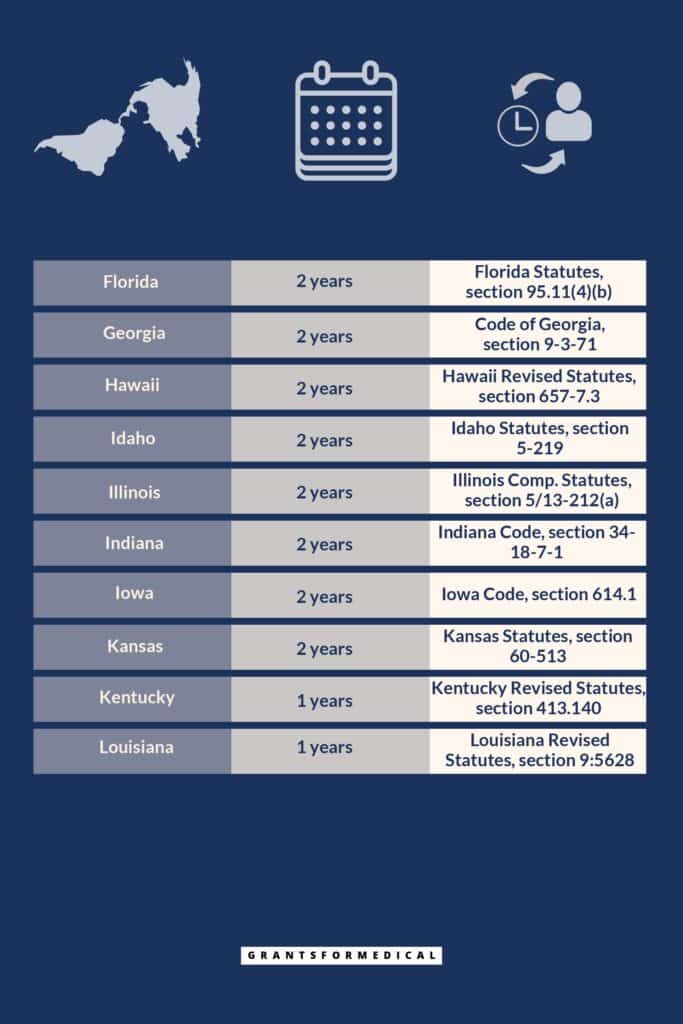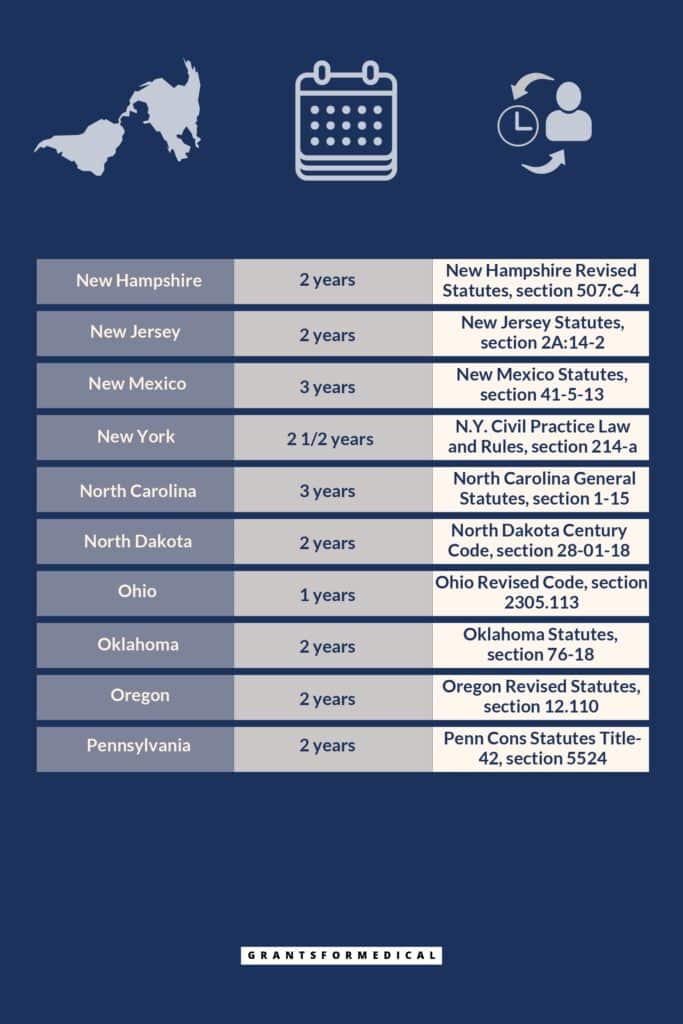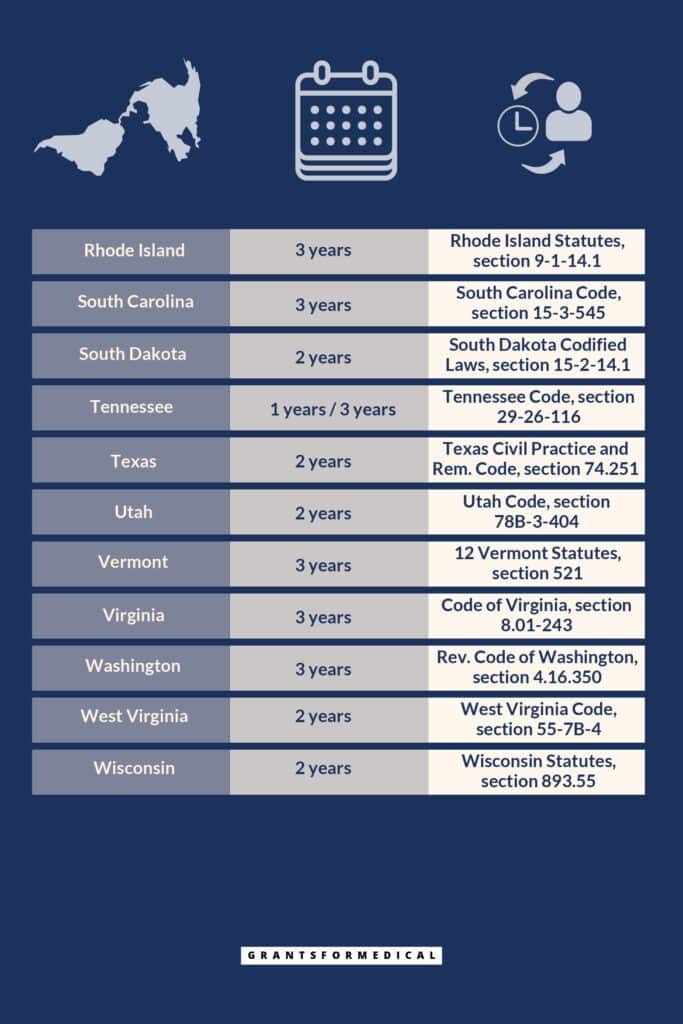Medical Malpractice Statute of Limitations (by state) – Overview
A statute of limitations is a law that prescribes a certain time frame in which someone can file a claim before they are barred from registering a complaint. These laws apply to civil and criminal actions, but their time limits vary according to the type of claim filed and the jurisdiction.
The statute of limitations restricts the duration in which a plaintiff or prosecutor can file a lawsuit or bring charges against a defendant.
In short, statutes of limitations are legally enforceable deadlines for filing a lawsuit. If the plaintiff or prosecutor fails to file the lawsuit within the stipulated time period, the defendant can seek respite from the fact that the statute of limitations has run its course and get the case dismissed.
Medical Malpractice Statutes of Limitations
Statutes of limitations do not apply to certain criminal cases, such as first-degree murder, allowing for charges to be filed regardless of the time elapsed since the crime. It means that a prosecutor can file charges against a murder suspect after any duration of time.
In contrast, medical malpractice cases have specific statutes of limitations, but they vary from state to state. Due to this, a plaintiff in a medical malpractice case will have a specific time limit to file a lawsuit against the defendant.
Medical malpractice occurs when a healthcare professional fails to meet the required standard of care in treatment, diagnosis, or management, harming the patient.
The statute of limitations for medical malpractice can seem complicated for a layperson. This is because it takes several months or years for a patient to realize that there was a lack of standard when being treated by a healthcare provider. This is also the case with medical negligence, as most medical malpractice cases are the base for medical malpractice lawsuits.
As some medical malpractice cases are not immediately obvious to the patient, the plaintiff may be allowed to file a lawsuit even if the statute of limitation for the particular type of case has expired.
Medical Malpractice Statutes of Limitations – by State
Generally, medical malpractice laws vary from state to state. This includes the statutes of limitations for medical malpractice lawsuits.
For instance, some states, like California, usually make exceptions to filing deadlines in medical malpractice cases, especially if the case contains elements of fraudulent activity on the defendant’s end. Many states also allow exceptions to their statutes of limitations for cases involving foreign objects left in a patient’s body, extending the time patients have to file a lawsuit upon discovery.
Besides this, most states provide different filing deadlines if the plaintiff in a medical malpractice case is a child (less than 18 years old). These laws allow a child to reach a certain age before they can successfully file a medical malpractice lawsuit.
Let’s take a quick look at the specific statutes of limitations for medical malpractice in different states:





| State | Time-Limit | Statute-of-Limitations |
|---|---|---|
| Alabama | 2 years | Code of Alabama, section 6-5-482 |
| Alaska | 2 years | Alaska Statutes, section 09.10.070 |
| Arizona | 2 years | Arizona Revised Statutes, section 12-542 |
| Arkansas | 2 years | Arkansas Code, section 16-114-203 |
| California | 1 year / 3 years | California Code of Civil Procedure, section 340.5 |
| Colorado | 2 years | Colorado Revised Statutes, section 13-80-102.5 |
| Connecticut | 2 years | Gen. Stat. of Connecticut, section 52-584 |
| Delaware | 2 years | Title 18 Delaware Code, section 6856 |
| D.C. | 3 years | D.C. Code Section 12-301 |
| Florida | 2 years | Florida Statutes, section 95.11(4)(b) |
| Georgia | 2 years | Code of Georgia, section 9-3-71 |
| Hawaii | 2 years | Hawaii Revised Statutes, section 657-7.3 |
| Idaho | 2 years | Idaho Statutes, section 5-219 |
| Illinois | 2 years | Illinois Comp. Statutes, section 5/13-212(a) |
| Indiana | 2 years | Indiana Code, section 34-18-7-1 |
| Iowa | 2 years | Iowa Code, section 614.1 |
| Kansas | 2 years | Kansas Statutes, section 60-513 |
| Kentucky | 1 year | Kentucky Revised Statutes, section 413.140 |
| Louisiana | 1 year | Louisiana Revised Statutes, section 9:5628 |
| Maine | 3 years | Maine Revised Statutes Title 24, section 2902 |
| Maryland | 3 years / 5 years | Maryland Cts & Jud. Proc. Code, section 5-109 |
| Massachusetts | 3 years | Massachusetts General Laws Ch. 260, section 4 |
| Michigan | 2 years | Michigan Comp. Laws, section 600.5805 |
| Minnesota | 4 years | Minnesota Statutes, section 541.076 |
| Mississippi | 2 years | Mississippi Code, section 15-1-36(1) |
| Missouri | 2 years | Missouri Revised Statutes, section 516.105 |
| Montana | 3 years | Montana Code, section 27-2-205 |
| Nebraska | 2 years | Nebraska Revised Statutes, section 44-2828 |
| Nevada | 3 years | Nevada Revised Statues, section 41A.097 |
| New Hampshire | 2 years | New Hampshire Revised Statutes, section 507:C-4 |
| New Jersey | 2 years | New Jersey Statutes, section 2A:14-2 |
| New Mexico | 3 years | New Mexico Statutes, section 41-5-13 |
| New York | 2 1/2 years | N.Y. Civil Practice Law and Rules, section 214-a |
| North Carolina | 3 years | North Carolina General Statutes, section 1-15 |
| North Dakota | 2 years | North Dakota Century Code, section 28-01-18 |
| Ohio | 1 year | Ohio Revised Code, section 2305.113 |
| Oklahoma | 2 years | Oklahoma Statutes, section 76-18 |
| Oregon | 2 years | Oregon Revised Statutes, section 12.110 |
| Pennsylvania | 2 years | Penn Cons Statutes Title-42, section 5524 |
| Rhode Island | 3 years | Rhode Island Statutes, section 9-1-14.1 |
| South Carolina | 3 years | South Carolina Code, section 15-3-545 |
| South Dakota | 2 years | South Dakota Codified Laws, section 15-2-14.1 |
| Tennessee | 1 years / 3 years | Tennessee Code, section 29-26-116 |
| Texas | 2 years | Texas Civil Practice and Rem. Code, section 74.251 |
| Utah | 2 years | Utah Code, section 78B-3-404 |
| Vermont | 3 years | 12 Vermont Statutes, section 521 |
| Virginia | 3 years | Code of Virginia, section 8.01-243 |
| Washington | 3 years | Rev. Code of Washington, section 4.16.350 |
| West Virginia | 2 years | West Virginia Code, section 55-7B-4 |
| Wisconsin | 3 years | Wisconsin Statutes, section 893.55 |
Using Statutes of Limitations
To ensure compliance with statutes of limitations for medical malpractice lawsuits, most states use the following formula:
- The statute will provide a specific period, either from the injury or from the discovery of an injury, that a plaintiff will have to file their claim
- If the plaintiff cannot file within the stipulated time, they are considered to have waived the right to file a lawsuit unless there is some exception.
Conclusion
Statutes of limitations for medical malpractice claims vary widely by state, typically ranging from 1 to 3 years from the date of injury or discovery of the injury, with specific exceptions potentially extending this period. Make sure to enquire about the specifics of your state’s statutes of limitations and consult with a renowned, experienced lawyer specializing in medical malpractice lawsuits to ensure your claim is valid.
See Also
How Does Malpractice Insurance Work?
Malpractice Insurance for Nurses